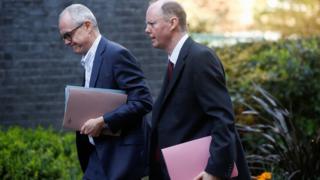
Many countries are taking tough measures to crack down on the spread of coronavirus, including school closures, an end to mass gatherings and severe travel restrictions. But the UK has adopted relatively modest control measures.
The differences can be partly explained by the fact some of these countries are further into their epidemics. But it's clear the UK has adopted a more nuanced approach.
Computer simulations indicate the UK is in the early stages of its epidemic which is expected to rise sharply in four weeks and peak in 10 and 14 weeks' time.
Sir Patrick Vallance, the UK government's chief scientific adviser, and chief medical officer Prof Chris Whitty have made the judgement call that it is too soon to impose severe restrictions at this stage.
Such restrictions might last several months and risk "self-isolation fatigue", with people leaving their homes just as the epidemic was at its height. The elderly are particularly at risk of developing severe symptoms. But many of them are already isolated. Cutting them off from their communities at this stage, when the risks are still relatively low, would create unnecessary difficulties for them.
Sir Patrick and Prof Whitty have also advised against the suspension of mass gatherings. Again, their computer models indicate this would be less effective and more disruptive than the measures they have recommended: hand washing and asking people to self-isolate if they show symptoms of the disease.
These measures, if correctly implemented, could cut the peak of cases by 20%, says Sir Patrick.
"People are very much more likely to catch the virus from a family member or a friend somewhere in a small space rather than a big space [such as a sporting stadium]," he said.
It's the same with school closures. While Ireland, France and Denmark are among a host of northern European countries to shut schools, for the moment at least they remain open in the UK.
Closing schools is effective for controlling serious flu epidemics, but Covid-19 seems to affect children less. There's still a risk, though, they could transmit it to their parents and grandparents. In addition, school closures would take many much needed NHS staff away from their jobs while they look after their children.
The British strategy is to delay the onset of the peak of the disease until the summer months, when the NHS is under less pressure, and to spread the peak of the epidemic to make treatment more manageable. The aim has also been to manage the spread of the infection so that the population builds up some immunity to the virus should it return in successive years.
Efforts to stamp it out too quickly risk leading to the epidemic returning, perhaps during the winter, once the extreme measures have been lifted. This would be a time when the health service was again under pressure.
It is important to stress that this strategy has been drawn up based on evidence and input from many of the world's leading scientists and doctors, many of whom have been involved in controlling the spread of the virus in China and Singapore. And it is notable that no UK epidemiologists - specialists in the spread of diseases - have spoken out in the mainstream media against the UK government's approach.
There are undoubtedly some who do disagree with the strategy. But there is an acceptance by such critics that Sir Patrick and Prof Whitty are the ones in the hot seat, having to make the biggest calls they have made in their professional lives. So the science community is prepared to give them the benefit of the doubt and not speak out, for now at least.
Clarification 14 March 2020: An earlier version of this article said no scientists had spoken out against the government. This has been updated to make clear that, at time of publication, no UK epidemiologists had spoken out in the mainstream media.